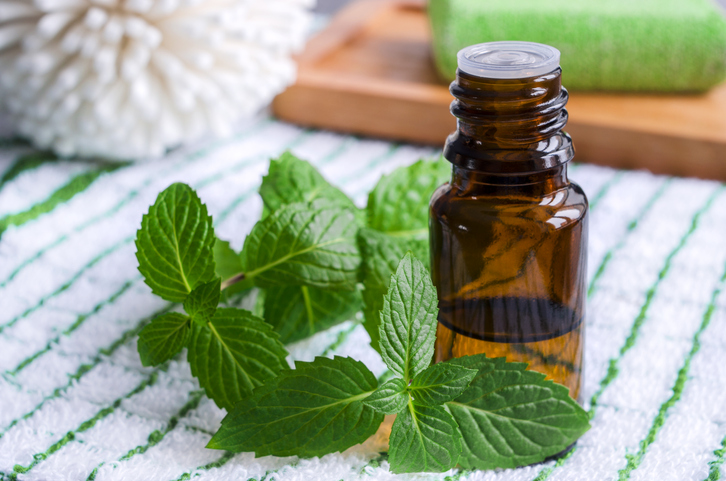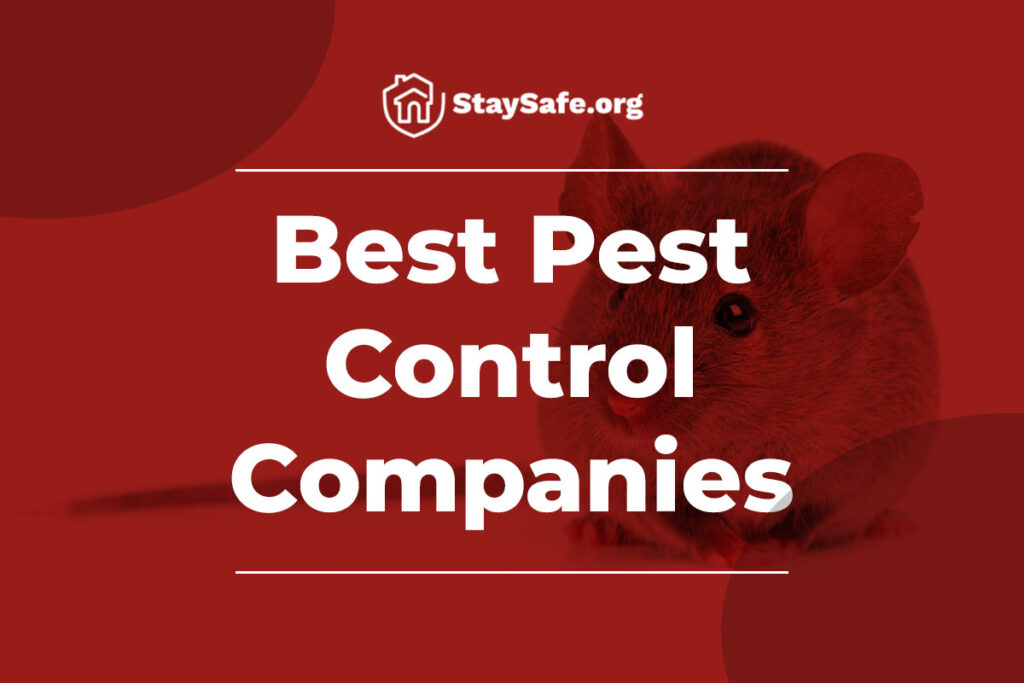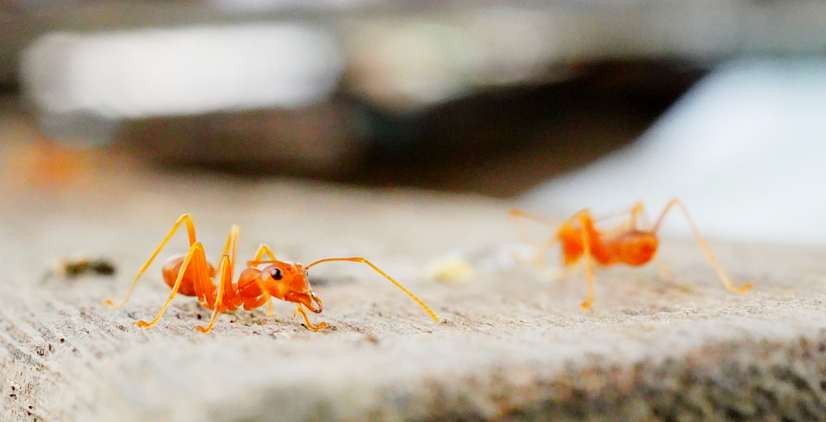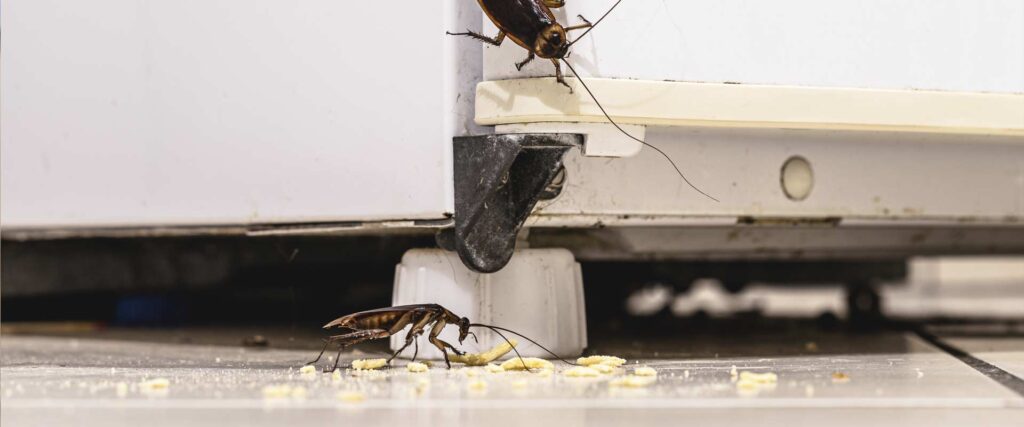When it comes to dealing with ant infestations, many people are seeking natural and eco-friendly alternatives to chemical pesticides. Peppermint oil has emerged as a popular option for ant control due to its strong scent and repellent properties. Derived from the peppermint plant, this essential oil offers a natural solution that can effectively deter ants without the use of harmful chemicals.

Understanding How Peppermint Oil Works Against Ants
Peppermint oil works against ants through its chemical properties and its impact on the ants’ sensory perception. The oil contains several compounds, including menthol, menthone, and limonene, which contribute to its strong scent and ant-repellent effects.
Ants rely on a sophisticated chemical communication system, primarily using pheromones, to navigate and communicate within their colonies. Pheromones are chemical signals that ants release to mark trails, locate food sources, and coordinate with other colony members.
Table of Contents
- Understanding How Peppermint Oil Works Against Ants
- Does Peppermint Oil Kill Ants Or Just Repel Them
- Scientific Evidence Behind Peppermint Oil As An Ant Deterrent
- Specifics About Peppermint Oil And Different Types Of Ants
- Creating Homemade Peppermint Oil Ant Repellent
- Comparisons And Combinations For Effective Ant Control
- Practical Aspects Of Using Peppermint Oil As Ant Deterrent
- Safety And Environmental Considerations Of Using Peppermint Oil
- Peppermint Oil And Pest Resistance
- Broader Uses Of Peppermint Oil For Pest Control
- Conclusion
Peppermint oil disrupts this communication system in multiple ways. Its strong scent overwhelms and masks the ants’ pheromone signals, making it difficult for them to follow established trails or locate food sources. The powerful aroma of peppermint oil can confuse and disorient the ants, causing them to lose their sense of direction and become deterred from entering treated areas.
Additionally, the compounds found in peppermint oil, such as menthol, menthone, and limonene, interfere with the ants’ sensory receptors. These compounds affect the ants’ ability to detect and process chemical signals, further hindering their navigation and communication abilities. As a result, ants may avoid areas where peppermint oil is present.
Does Peppermint Oil Kill Ants Or Just Repel Them
Peppermint oil primarily acts as a repellent rather than a lethal agent against ants. While the strong scent and chemical composition of peppermint oil can deter ants and disrupt their behavior, it is not typically known to directly kill them.
It’s worth noting that the effectiveness of peppermint oil in controlling ants may vary depending on factors such as the species of ants, the concentration and quality of the oil, and the specific circumstances of the infestation. While some individuals may report success in using peppermint oil alone to control ants, others may find it more effective when combined with other pest control methods, such as sealing entry points or using ant baits.
Scientific Evidence Behind Peppermint Oil As An Ant Deterrent
Scientific evidence strongly supports the use of peppermint oil as an effective ant deterrent. Several studies have demonstrated its potential in repelling ants and disrupting their foraging patterns. One notable study published in the Journal of Economic Entomology (2001) showed that peppermint oil significantly reduced ant activity and disrupted foraging trails, indicating its potential as an environmentally friendly ant repellent. Additionally, a study in Pest Management Science (2014) found that peppermint oil displayed strong repellency against red imported fire ants, leading to a notable decrease in their movement and foraging activity. These studies, along with others, provide compelling evidence of peppermint oil’s efficacy in deterring ants. However, further research is still needed to fully establish its long-term effectiveness and optimal application methods. Nevertheless, the scientific evidence available thus far supports the use of peppermint oil as a natural and eco-friendly solution for managing ant infestations.
Specifics About Peppermint Oil And Different Types Of Ants
Peppermint oil has shown effectiveness as a repellent against various types of ants. While ants share common traits and communication systems, there may be variations in their susceptibility to peppermint oil based on species-specific characteristics. Understanding these differences can help determine the effectiveness of peppermint oil for ant control.
Certain types of ants have been found to be more susceptible to the repellent effects of peppermint oil. For example, studies have demonstrated that red imported fire ants, Argentine ants, and odorous house ants exhibit reduced activity and disrupted foraging trails when exposed to peppermint oil.
However, it is important to note that the efficacy of peppermint oil can vary depending on factors such as the concentration used, the specific circumstances of the infestation, and the behavior of the ant colony. Different ant species may have varying sensitivities to the compounds found in peppermint oil, and the extent of their response to its repellent properties can differ.
Can Peppermint Oil Be Used To Control Fire Ants?
Fire ants, including the notorious red imported fire ants, pose a significant challenge for ant control due to their aggressive nature and large colonies. While peppermint oil has shown promise as a repellent for various types of ants, its effectiveness as the sole method for controlling fire ants may be limited.
Fire ants are known for their ability to adapt to changing environments and overcome deterrents. They possess strong sensory receptors and are less affected by certain repellents compared to other ant species. Therefore, while peppermint oil may deter fire ants to some extent, it is unlikely to provide complete control or elimination of a fire ant infestation on its own.
To effectively control fire ants, it is recommended to implement a comprehensive integrated pest management approach. This may involve combining peppermint oil as a deterrent with other strategies such as baiting, mound treatments, and physical barriers. Professional pest control services can provide tailored solutions and expertise in dealing with fire ant infestations.
Creating Homemade Peppermint Oil Ant Repellent
Making your own peppermint oil ant repellent at home is a simple and cost-effective solution. To create this repellent, you’ll need pure peppermint essential oil, water, and a spray bottle. Start by filling the spray bottle with water, leaving some space at the top. Add 10-15 drops of pure peppermint essential oil to the water, close the spray bottle, and shake well to ensure proper mixing. Your homemade peppermint oil ant repellent is now ready to use.
Using Peppermint Oil Spray For Ant Control
To effectively use the peppermint oil spray for ant control, follow these steps. First, identify areas where ants are entering your home or where their trails are visible. Clean those areas to remove any food particles or other attractive scents for ants. Shake the spray bottle well before each use to evenly distribute the oil. Spray a generous amount of the peppermint oil repellent along ant trails, entry points, and areas of ant activity. Focus on spraying areas where ants are likely to enter or travel. Reapply the spray regularly, especially after cleaning or rainfall, as the scent may fade over time.
Comparisons And Combinations For Effective Ant Control
When it comes to ant control, various options are available, including natural remedies like peppermint essential oil and commercial ant repellents. Understanding the differences in effectiveness and exploring possible combinations can help in creating a comprehensive approach to ant control.
Peppermint Essential Oil Vs Peppermint Extract For Ant Control
Peppermint essential oil and peppermint extract are two commonly used substances for ant control, but they differ in potency and effectiveness. Peppermint essential oil is highly concentrated and contains higher levels of active compounds, making it more effective as an ant repellent. On the other hand, peppermint extract is a milder form and may not have the same level of effectiveness as the essential oil. If possible, opt for pure peppermint essential oil for optimal results in ant control.
Comparing Peppermint Oil To Commercial Ant Repellents
When comparing peppermint oil to commercial ant repellents, it is essential to consider their ingredients and the specific ant species they target. While commercial ant repellents often contain chemicals designed to deter ants, peppermint oil provides a natural alternative. Scientific studies have shown that peppermint oil can be an effective ant repellent, disrupting their foraging patterns and reducing activity. However, the efficacy of commercial ant repellents can vary depending on the product and the ant species being targeted. It is important to read labels, research product reviews, and choose reputable brands to find the most effective commercial ant repellents if opting for this approach.
Combining Peppermint Oil With Other Natural Remedies For Ant Control
Combining peppermint oil with other natural remedies can enhance the overall effectiveness of ant control. Some natural remedies that can be used in combination with peppermint oil include vinegar, cinnamon, citrus peels, and diatomaceous earth. Vinegar can disrupt ant trails and deter them from entering specific areas. Cinnamon acts as a natural ant repellent and can be sprinkled near entry points. Citrus peels, particularly from oranges or lemons, contain compounds that ants find unpleasant, making them effective deterrents. Diatomaceous earth is a natural substance that can be sprinkled in areas where ants are present. It works by dehydrating and killing ants, complementing the repellent properties of peppermint oil. When combining these natural remedies, it is important to use them strategically and maintain a clean environment to prevent attracting ants.
Practical Aspects Of Using Peppermint Oil As Ant Deterrent
When it comes to using peppermint oil as an ant deterrent, there are practical considerations to keep in mind to ensure effective ant control.
How Long Does It Take For Peppermint Oil To Repel Ants
The time it takes for peppermint oil to repel ants can vary, but typically you can expect to see changes in their behavior within a few hours to a day of exposure. While initial responses may occur quickly, it may take several days to a week to observe a significant reduction in ant activity, especially for larger infestations. To ensure effectiveness, it’s important to maintain a regular application schedule, reapplying the oil every few days or as needed. This helps reinforce the repellent effect and discourages ants from reestablishing their trails. Monitoring ant activity and adjusting the frequency of peppermint oil application will help gauge its effectiveness and achieve long-term ant control.
To maintain effective ant control with peppermint oil, follow a specific application schedule. Apply peppermint oil generously along ant trails, entry points, and areas of activity. Initially, apply the oil daily for the first week, then reduce the frequency to every two to three days for regular maintenance. Continuously monitor ant activity and adjust the application frequency as needed. Consider environmental factors such as cleaning, rainfall, or high temperatures that may diminish the oil’s effectiveness, and reapply immediately after such events. By adhering to this schedule, you can ensure the peppermint oil remains potent and deters ants effectively, maintaining a pest-free environment.
Can Peppermint Oil Be Used For Ant Control In The Garden?
Peppermint oil can also be used for ant control in the garden. Apply it around plant bases, along garden borders, and near ant trails to deter ants from damaging plants or establishing nests. However, it’s important to note that the effectiveness of peppermint oil in outdoor settings may be reduced due to environmental factors and the presence of other attractive scents. Consider using additional strategies such as physical barriers, companion planting, or organic insecticides to enhance the overall control of ants in the garden.
Safety And Environmental Considerations Of Using Peppermint Oil
When using peppermint oil as an ant deterrent, it is important to consider the safety aspects and potential environmental impacts associated with its use.
Potential Side Effects Of Peppermint Oil As An Ant Deterrent
Peppermint oil is generally considered safe for use, but it can cause skin irritation or allergic reactions in some individuals. It is recommended to perform a patch test on a small area of skin before widespread application. Additionally, avoid direct contact with eyes or sensitive mucous membranes. If accidental ingestion occurs or adverse reactions are experienced, seek medical attention promptly. As with any essential oil, it is crucial to handle peppermint oil with care and follow proper safety guidelines during usage.
Impact On Pets And Children
When used responsibly, peppermint oil is typically safe for pets and children. However, some pets may have sensitivities or allergies to certain essential oils, including peppermint oil. It is advisable to consult with a veterinarian before using peppermint oil in households with pets. Similarly, ensure that children are not directly exposed to undiluted peppermint oil and supervise their interaction with treated areas. It is best to use child-resistant packaging and store peppermint oil securely, out of reach of children and pets.
Environmental Impacts Of Peppermint Oil For Ant Control
Peppermint oil is considered an environmentally friendly alternative for ant control compared to chemical pesticides. It rapidly biodegrades and does not leave long-lasting residues in the environment. However, it is important to be mindful of the overall ecological balance. Avoid excessive application and consider the potential impact on beneficial insects, such as bees and butterflies. Target the use of peppermint oil specifically to areas with ant activity, minimizing unnecessary dispersion into the environment.
Specific Brands For Effective Ant Control
It is worth noting that the effectiveness of peppermint oil as an ant deterrent is primarily determined by the concentration of its active compounds rather than specific brands. However, some brands are known for offering high-quality peppermint oil that can be effective for ant control. Remember to carefully read product labels and choose oils that are labeled as 100% pure and suitable for aromatherapy or topical use. Here are a few reputable brands that are commonly recommended:
Now Foods
Now Foods is a well-known brand that offers a wide range of essential oils, including peppermint oil. They are known for their commitment to quality and purity, ensuring that their oils are 100% pure and free from additives or dilutions.
Plant Therapy
Plant Therapy is another reputable brand that specializes in essential oils. They have a dedicated line of peppermint oil that is popular among users for its quality and effectiveness. Their oils undergo rigorous testing to ensure their purity and potency.
Aura Cacia
Aura Cacia is a trusted brand that offers a diverse selection of essential oils, including peppermint oil. They are known for their sustainable sourcing practices and strict quality standards, making them a reliable choice for ant control.
Edens Garden
Edens Garden is a brand that prides itself on offering high-quality, pure essential oils. They have a strong reputation in the industry and provide a range of peppermint oil options that can be suitable for ant control.
Recommended Peppermint Oil Concentration For Ant Control
A recommended concentration for peppermint oil to effectively repel ants is approximately 5% to 10%. This concentration strikes a balance between potency and safety. To achieve this, dilute the peppermint oil with a carrier oil, such as coconut oil or almond oil, at a ratio of 5 to 10 drops of peppermint oil per ounce of carrier oil. This diluted solution can then be applied to the desired areas for ant control. Adjust the concentration based on the level of ant activity and the sensitivity of the treated area.
Peppermint Oil And Pest Resistance
When it comes to using peppermint oil as a natural pest control method, one question that often arises is whether ants or other pests can develop resistance to its effects over time. Let’s explore this topic in detail:
Resistance Development in Ants
As of the current understanding in scientific research, there is no evidence to suggest that ants can develop resistance specifically to peppermint oil. Peppermint oil works by interfering with the ants’ ability to detect scent trails and communicate with each other, ultimately disrupting their foraging and nesting behavior. This mechanism of action is not typically associated with the development of resistance.
It is important to note that resistance in pests usually occurs when they are exposed to chemical insecticides or pesticides repeatedly over generations. This exposure can lead to genetic changes in the pest population, allowing some individuals to survive or become less affected by chemical treatments. However, since peppermint oil is a natural repellent and does not contain the same active ingredients as conventional pesticides, the likelihood of resistance development is significantly lower.
The Diversity Of Peppermint Oil Compounds
Peppermint oil contains several active compounds, such as menthol and menthone, which contribute to its repellent properties. These compounds work synergistically, making it difficult for pests to develop resistance to the combined effects of multiple components. Additionally, pests would need to adapt to a complex mixture of compounds rather than a single chemical, which further reduces the likelihood of resistance development.
Rotating Pest Control Methods
To maintain long-term effectiveness and prevent potential resistance, it is generally recommended to adopt an integrated pest management (IPM) approach. This involves rotating different pest control methods, including natural remedies like peppermint oil, as well as physical and cultural control measures.
By alternating between different methods, you can avoid excessive reliance on a single approach, reducing the chances of pests adapting and developing resistance. Incorporating practices such as proper sanitation, sealing entry points, and removing attractants can further enhance the effectiveness of peppermint oil as part of an integrated pest management strategy.
Broader Uses Of Peppermint Oil For Pest Control
Peppermint oil is not only effective in deterring ants but also finds applications in controlling a wide range of other pests. Let’s explore the broader uses of peppermint oil for pest control:
Insects
Peppermint oil can help repel various insect pests, including mosquitoes, flies, spiders, and cockroaches. Its strong aroma acts as a deterrent, making the environment inhospitable for these pests. By using peppermint oil in diffusers, sprays, or as a surface treatment, you can create a pest-free zone in your home or outdoor areas.
Mice And Rats
Peppermint oil has been used as a natural remedy to deter mice and rats. The strong scent of peppermint oil is believed to be offensive to these rodents, making them less likely to enter or remain in treated areas. Placing cotton balls soaked in peppermint oil near entry points or using peppermint oil-infused sachets can help repel mice and rats.
Bed Bugs
While peppermint oil alone may not eliminate a bed bug infestation, it can be used as part of a comprehensive strategy. Peppermint oil can be combined with other essential oils like lavender, tea tree, or eucalyptus oil to create a natural bed bug repellent. This mixture can be applied to bedding, furniture, and cracks and crevices where bed bugs may hide.
Fleas
Peppermint oil can be effective in repelling fleas from your pets and living spaces. However, it is important to note that undiluted peppermint oil may be too strong for direct application on pets’ skin. Instead, dilute a few drops of peppermint oil in water and use it as a spray on pet bedding, carpets, and furniture to deter fleas.
Garden Pests
Peppermint oil can also be used to control pests in the garden. It acts as a natural insect repellent, helping to deter pests like aphids, beetles, and cabbage worms. Dilute peppermint oil in water and spray it on plants or apply it to the surrounding soil to create a protective barrier. This method can be particularly useful for small-scale gardening or in combination with other organic gardening practices.
It’s important to remember that while peppermint oil can be effective in repelling various pests, its impact may vary depending on the pest species and the severity of the infestation. For more severe pest problems, it is advisable to consult with a professional pest control service to determine the most appropriate and effective course of action.
Conclusion
Peppermint oil offers a natural and effective solution for ant control. Its strong scent acts as a repellent, disrupting ants’ ability to detect scent trails and communicate with each other. Peppermint oil can be easily applied using homemade sprays or diluted solutions, making it a convenient option for both indoor and outdoor ant control. With its environmentally friendly nature and minimal risks to humans and pets when used responsibly, peppermint oil provides a safe and sustainable alternative to chemical pesticides. By incorporating peppermint oil into an integrated pest management approach and considering the specific needs of different ant species, you can successfully deter ants and maintain a pest-free environment.




